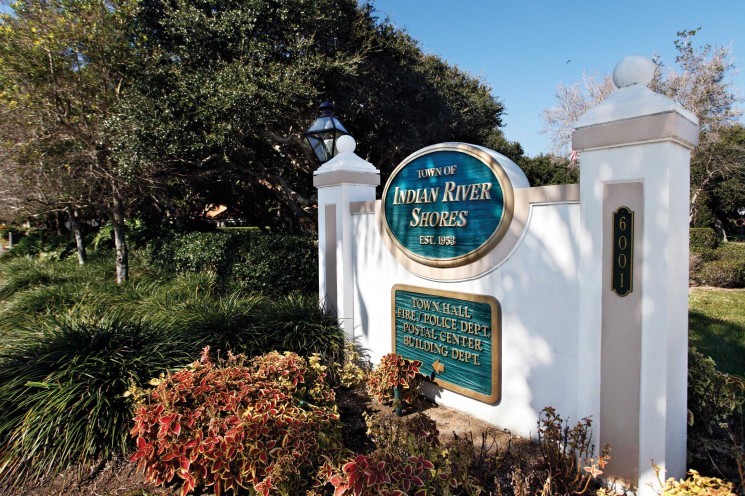
INDIAN RIVER SHORES — The Town of Indian River Shores now has a powerful ally in its battle with the City of Vero Beach utility staff and GAI Consultants over whether it would owe Vero almost $10 million if it switches and obtains water and sewer services from the County.
On Monday, the respected Tallahassee law firm of Nabors Giblin & Nickerson issued an opinion for its client, the Indian River Board of County Commissioners, on what has become a contentious discussion about who will own the pipes, pumps and other utility equipment in the Shores after its 30-year franchise agreement with Vero ends in November 2016.
The bottom line: The Shores would owe next to nothing.
Attorney Brian P. Armstrong stated that the Shores’ franchise agreement clearly states that all the water and wastewater assets – except for a few components singled out in the contract – revert back to the Shores, period.
“It is our opinion that the Town Franchises require the City to convey all water and wastewater assets within the Town’s borders of the Town, effective upon franchise termination, without any compensation owed to the City,” the letter states.
Armstrong’s analysis directly rebuts public statements and memos put forth by the City of Vero Beach’s experts and by water-sewer Director Rob Bolton.
Bolton’s position, buttressed by advice from GAI Consultants, is that the Vero-owned assets within the Shores are worth approximately $9.8 million and that Indian River County would need to cut a check for that amount, or negotiate a long-term lease, in order to service the Shores from 2016 going forward.
Until now, GAI’s principal Gerry Hartman and Tom Cloud of the Gray Robinson law firm have monopolized the discussion about ownership of the Shores’ water and sewer assets.
The city’s consultants were so confident in their position that they issued an appraisal of the Vero Beach water and sewer system based partially on the assumption that Vero would own the Shores’ assets and continue to serve the Shores in the future.
Vero Beach City Manager Jim O’Connor recently joined that school of thought.
“It would be my recommendation that if Indian River Shores chooses to accept the county offer at the end of our contractual period, that the City either lease or sell the assets owned by the City to the County,” he said in a letter last week. “This would be a negotiated deal between the City and County.”
Less than a month ago, it was a toss-up which way the Shores Town Council was leaning on whether to sign on with Vero or Indian River County for 30 more years of utility service.
O’Connor then made a proposal that appeared it might just carry the day for Vero – a proposal to match Indian River County rates for Shores residents if they would stick with the Vero Beach system.
That option eliminated most of the fears the Shores has had about rate stability as its rates would be tied to county rates, and county rates are not expected to go up for at least five, maybe even 10, years.
On the heels of what could have been a smart move for Vero Beach, Bolton made the misstep of floating the idea that Vero might take the Shores to court to have a judge decide who will own the utility assets in 2016.
Although presumably intended to pressure the Shores into staying in the Vero Beach Utilities fold, the move instead prompted the Shores to ask Indian River County for help.
The Shores had no choice but to seek outside advice.
So the deck has been shuffled again, this time with the Shores aligned, legally at least, with Indian River County and its experts.
The Nabors Giblin & Nickerson opinion shoots holes in Vero’s two biggest arguments.
The first argument – that Vero should own the assets after nearly three decades of maintaining and enhancing the delivery system – seems to contradict what Armstrong said is the intention of a franchise agreement.
“The requirement in the Town Franchises that utility assets revert to the Town if the Franchises are terminated cannot simply be ignored by the City,” Armstrong states.
The second argument about the meaning of the word “revert” in the contract, which has been construed by Vero to mean that only the assets in place in 1986 would revert to the Shores, seems even weaker.
Armstrong points out that courts view franchise agreements in favor of the grantor, which in this case would be the Shores, and against the grantee, which would be Vero Beach Utilities.
“To the extent that the City could convince a court that the use of the word ‘revert’ creates an ambiguity, the pertinent case law identified earlier in this memorandum provides that an ambiguity identified in a franchise such as the Town Franchises shall be construed strictly in favor of the grantor/government,” the letter states.
County Attorney Alan Polackwich had long said that the Shores had rightful claim to ownership of their own utility assets post-franchise, but considering the elevated heat associated with water-sewer negotiations over the past couple of years, the county felt it best to get an independent opinion from a law firm with extensive experience in the utility specialty of municipal law.
Polackwich said Monday that he had shared the memorandum with Indian River Shores Town Attorney Chester Clem, but Polackwich declined to comment on how the opinion might come into play in ongoing negotiations between Indian River County and the Shores.



